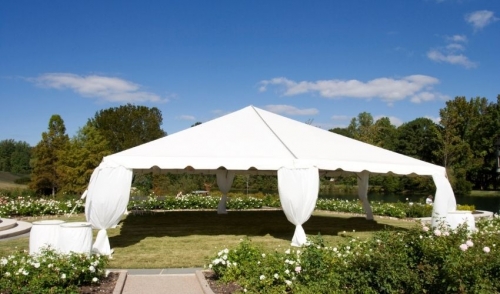{article.name}
Reasons to Rent a Tent During Coronavirus

- Share this:
- Share on Facebook
- Pin on Pinterest
- Tweet on Twitter
With ongoing concerns about crowds and continued urging to maintain safe social distancing practices during the coronavirus pandemic, renting tents can become creative solutions for many schools, businesses, events, and other groups. Understanding how to best rent a tent during coronavirus can help you make the best choices for a safe and enjoyable gathering.
The Importance of Social Distancing
While our understanding of SARS-CoV-2, the virus that causes COVID-19, is still evolving, one thing is clear – the disease is highly communicable. Furthermore, the disease can potentially be transmitted without clear or obvious symptoms of infection. While transmission rates vary, the most prominent transmission comes from respiratory droplets that may spread through coughing, talking, singing, sneezing, laughing, or other respiratory exhalations.
Keeping a minimum distance of six feet between individuals reduces the risk of transmission by minimizing the person-to-person contact of those respiratory droplets. This “social distancing” allows people to still pursue necessary activities while lessening the risk of viral transmission and further infections.
How Tents Can Help
It isn’t possible to increase the size of classrooms, meeting halls, ballrooms, lecture halls, cafeterias, and other indoor spaces in order to allow additional guests and attendees to have enough space to stay six feet apart. Renting tents, however, can provide a temporary expansion to existing space and allow people to spread out to safer distances. In some cases, outdoor tents can completely replace typical indoor venues, not only with more room to move about, but also providing better natural air circulation to disperse and dry out respiratory droplets, rendering the virus much less infectious.
Ways to Use Tents During Coronavirus
There are different tent options for nearly every type of gathering or crowd that may be necessary during the coronavirus pandemic. Different locations can use tents to augment their space and keep everyone comfortable as well as safely distanced.
- Schools – From kindergarten to universities, tents can create temporary outdoor classrooms with more space than indoor rooms. Schools can also use tents to create extra seating near the cafeteria or dining halls, or can use tents for drive-thru registration, textbook collection, or other necessary tasks.
- Restaurants – Cafes and restaurants can add easy outdoor seating to their establishments with the right tents. Tents can also be used as a socially-distanced waiting area for busy restaurants as reservations are filled or patrons are on a waitlist. A tent could also provide a larger break area for employees.
- Retail Businesses – Smaller retail businesses and shops may consider using tents as designated spaces for curbside pickup so customers don’t need to come into the store to fulfill their orders. Tents can also be used for sidewalk sale areas or clearance racks to space out these popular areas.
- Churches – Churches and temples of any faith can use tents to add more seating for services, including drive-thru communion or other sacraments. Tents could also be used to separate different services, such as Sunday school or youth group activities, as well as for fellowship events such as meals, speakers, or celebrations.
- Salons – Any salon could easily use small tents as extra space for clients seeking personalized services, such as simple haircuts, manicures, pedicures, or massages. Tents could also provide outdoor waiting areas for clients before their appointments.
- Day Care Centers – Preschools, nursery schools, headstart programs, and day care centers could use tents for separating activities and keeping young children spaced out instead of reusing multipurpose space. Tents can also be great for picnic areas or parent drop offs and pickups.
- Hospitals – In areas where coronavirus testing is offered, tents can be used for screenings instead of crowding indoor waiting rooms. Tents could also be provided for standard immunizations, check ins, and general waiting areas to provide more space between patients.
- Events – Any event where tents might normally be rented, such as weddings, reunions, garden parties, or graduations, can still use tents during coronavirus. Choosing a larger tent than originally anticipated will permit extra space to promote better social distancing.
Tips for Renting Tents During Coronavirus
Regardless of the reason for renting tents to space guests, customers, clients, parishioners, or patrons out for social distancing, there are ways to make the most of every coronavirus tent rental.
- Investigate what cleaning and sanitation protocols the rental company uses between tent rentals, and what other steps they use to keep their rentals safe.
- Calculate the appropriate tent size not only on guest occupancy, but on social distancing recommendations. A larger tent will provide more distance for everyone.
- Measure carefully to determine whether the site can support a larger tent or with appropriate spacing between smaller tents.
- If possible, choose a tent with window or side panels that can be opened to promote better fresh air circulation and healthy ventilation.
- Ensure the tent is set up properly with adequate support, tie-downs, and other safety features so it can withstand the anticipated use and weather.
- Inquire about discount options or reduced rates for different organizations or longer term rental periods.
- Read the rental contract carefully and follow all guidelines for pickup or delivery, as well as the condition of the tent upon return, to avoid any penalties or added fees.
After the Pandemic Ends
While there will eventually be a vaccine developed for COVID-19, social distancing precautions are likely to remain in place for some time. Practicing safe distancing is not only helpful to minimize the transmission of coronavirus, but can also be helpful to contain other communicable disease, including the seasonal flu, the common cold, and other coronaviruses. By knowing how and why to rent tents during outbreaks, businesses, schools, restaurants, and other community services can safely make the most of their space.

Comments